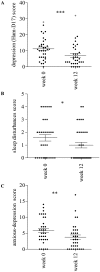Depression in patients with mastocytosis: prevalence, features and effects of masitinib therapy
- PMID: 22031830
- PMCID: PMC3198767
- DOI: 10.1371/journal.pone.0026375
Depression in patients with mastocytosis: prevalence, features and effects of masitinib therapy
Abstract
Depression in patients with mastocytosis is often reported but its prevalence and characteristics are not precisely described. In addition, the impact of therapies targeting mast cells proliferation, differentiation and degranulation on psychic symptoms of depression have never been investigated. Our objective was to determine the prevalence and to describe features of depression in a large cohort of mastocytosis patients (n = 288) and to investigate the therapeutic impact of the protein kinase inhibitor masitinib in depression symptoms. The description of depression was based on the analysis of a database with Hamilton scores using Principal Component Analysis (PCA). Efficacy of masitinib therapy was evaluated using non parametric Wilcoxon test for paired data within a three months period (n = 35). Our results show that patients with indolent mastocytosis present an elevated prevalence of depression (64%). Depression was moderate in 56% but severe in 8% of cases. Core symptoms (such as psychic anxiety, depressed mood, work and interests) characterized depression in mastocytosis patients. Masitinib therapy was associated with significant improvement (67% of the cases) of overall depression, with 75% of recovery cases. Global Quality of Life slightly improved after masitinib therapy and did not predicted depression improvement. In conclusion, depression is very frequent in mastocytosis patients and masitinib therapy is associated with the reduction its psychic experiences. We conclude that depression in mastocytosis may originate from processes related to mast cells activation. Masitinib could therefore be a useful treatment for mastocytosis patients with depression and anxiety symptoms.
Conflict of interest statement
Figures


References
-
- Valent P, Horny HP, Escribano L, Longley BJ, Li CY, et al. Diagnostic criteria and classification of mastocytosis: a consensus proposal. Leuk Res. 2001;25:603–625. - PubMed
-
- Lennert K, Parwaresch MR. Mast cells and mast cell neoplasia: a review. Histopathology. 1979;3:349–365. - PubMed
-
- Metcalfe DD. Classification and diagnosis of mastocytosis: current status. J Invest Dermatol. 1991;96:2S–4S. - PubMed
-
- Valent P, Akin C, Escribano L, Fodinger M, Hartmann K, et al. Standards and standardization in mastocytosis: consensus statements on diagnostics, treatment recommendations and response criteria. Eur J Clin Invest. 2007;37:435–453. - PubMed
-
- Valent P, Akin C, Sperr WR, Horny HP, Metcalfe DD. Mast cell proliferative disorders: current view on variants recognized by the World Health Organization. Hematol Oncol Clin North Am. 2003;17:1227–1241. - PubMed
Publication types
MeSH terms
Substances
LinkOut - more resources
Full Text Sources
Other Literature Sources
Medical

